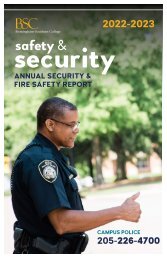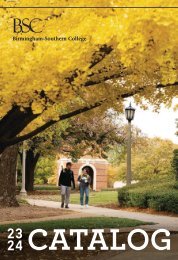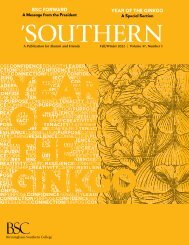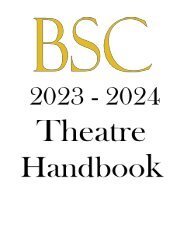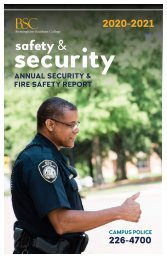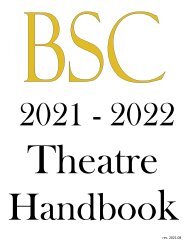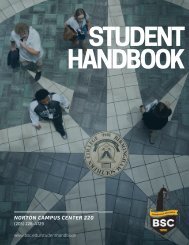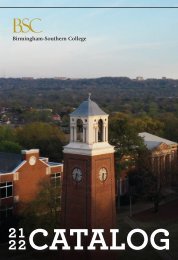2023-2024 BSC Catalog Updated_UG ONLY_FINAL[82]
You also want an ePaper? Increase the reach of your titles
YUMPU automatically turns print PDFs into web optimized ePapers that Google loves.
ACADEMIC PROGRAMS<br />
125<br />
SN 390<br />
SO 190<br />
SO 290<br />
SO 340<br />
at least a 2.500 grade point average on all coursework at the College<br />
Religion<br />
Bachelor of Arts<br />
Kelsey Grissom, Keely Sutton<br />
Religion is a fundamental part of the human experience and an inextricable dimension<br />
of thought, belief, ethics, politics, society, culture, and the arts. The discipline of<br />
religious studies asks how different cultures have put together the worlds in which they<br />
live. Areas of inquiry include the history of local and global religious traditions,<br />
spiritual dimensions of human experience, religious dimensions of culture, and the<br />
place of religion in society. Ultimately, the study of religion helps students to<br />
understand the complex processes by which individuals and groups create meaning for<br />
themselves and imbue those meanings with power.<br />
Religious studies are inherently intercultural and interdisciplinary, and creativity and<br />
connection are encouraged. The department of religion offers courses on topics such as<br />
the ethics of war and peace, saints and sainthood, religion and violence, the cultural<br />
context of the Hebrew Bible, the history of Christian thought, religion and the<br />
construction of gender, and representations of religion in art, music, and film. The<br />
department also offers opportunities to study Hebrew and organizes engaged learning<br />
experiences in the Birmingham area through visits to local religious communities and<br />
service-learning projects. All of these offerings share a common focus on inquiring into<br />
the religious worlds that humans create.<br />
Religion students are frequently motivated by concerns about social justice, curiosity<br />
about both familiar and unfamiliar cultures, an interest in religious experience and<br />
practice, and a general desire to understand people more fully. Because the academic<br />
study of religion teaches such valuable and transferrable skills as critical and creative<br />
thinking, effective and purposeful communication, and rigorous research, religion<br />
majors and minors are prepared upon graduation to pursue a variety of vocations:<br />
graduate work in religious studies or theology, social work, public health, law,<br />
medicine, business, and more.<br />
Upon completion of the religion major, students will be able to<br />
• demonstrate a significant familiarity with at least one religious tradition,<br />
recognize its diverse manifestations in particular cultural contexts, and engage in<br />
informed discussion of its history and practices<br />
• interpret “textual religion” and apply the methodologies (linguistic, literary,<br />
sociological, historical, rhetorical, or ideological) that relate to the critical<br />
interpretation of sacred texts and religious writings<br />
Birmingham-Southern College <strong>Catalog</strong> <strong>2023</strong>-<strong>2024</strong>


![2023-2024 BSC Catalog Updated_UG ONLY_FINAL[82]](https://img.yumpu.com/68414854/125/500x640/2023-2024-bsc-catalog-updated-ug-only-final82.jpg)

